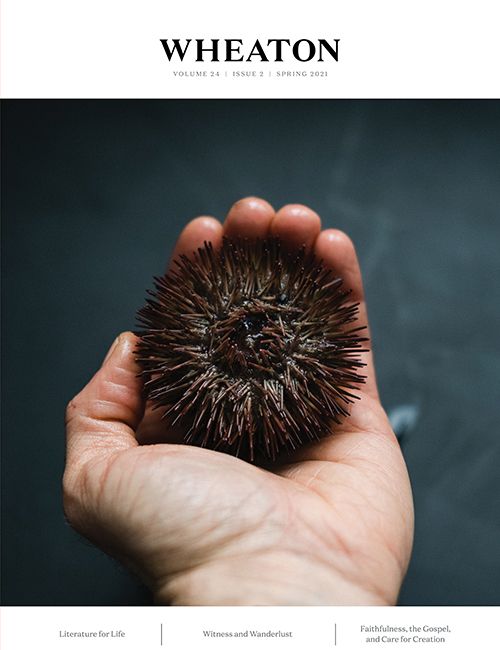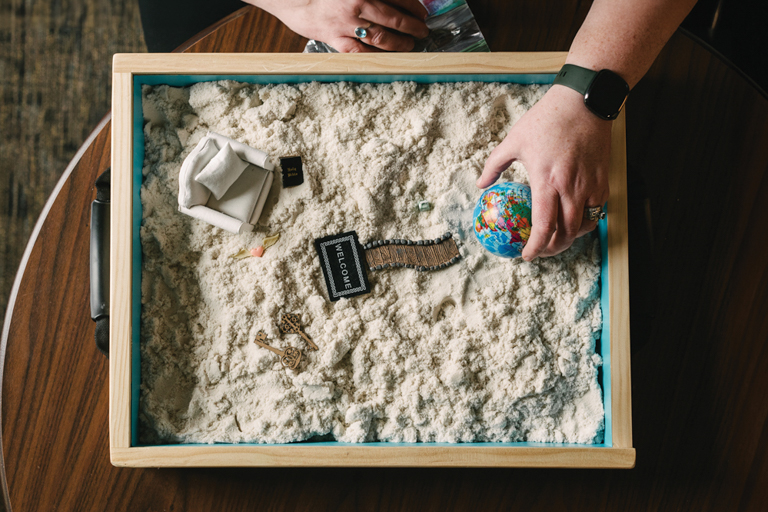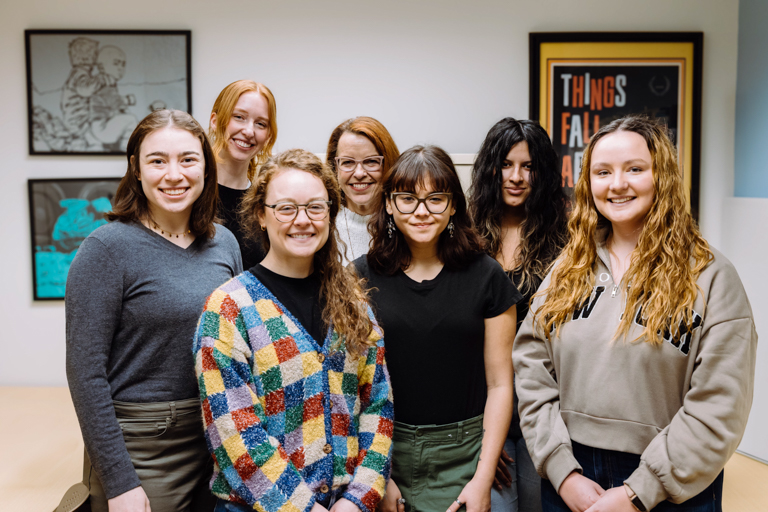Witness and Wanderlust
50 Years of The International Study Program
Words: Ciera Horton McElroy ’17 with research by Tennyson Bush ’20
Photos: Center for Faith, Politics & Economics

1978, Castle de Haar, Utrecht, the Netherlands.
Leningrad, 1985: Not somewhere you’d want to be at 3:00 in the morning. But this is where Dr. Mark Amstutz found himself, winding through the darkened streets with his Soviet guide.
The destination? An underground prison where two unassuming Wheaton students were held by the secret police.
The mishap began as dusk settled over the communist city. Two students on the International Study Program (ISP) rendezvoused with Russian traders in a downtown park, eager to trade American goods like shoes and denim for black market souvenirs. Usually, this was fine. But tonight, the dealers brought high-value contraband: Russian Orthodox icons.
“An undercover agent spotted the group,” recalled Amstutz, who advocated for the students in the middle of the night. “They were released when it became clear that they had not traded icons. . . . [It] was one of the most unforgettable experiences in my many years directing ISP.”

1978, Brandenburg Gate, West Berlin, looking toward East Berlin
Wheaton’s International Study Program was marked by immersion, living history, and just a little bit of mischief. This was not just any study abroad program. Throughout ISP’s early years, students witnessed the stark contrast between East and West Berlin, swam in the straits of the Bosphorus, met future spouses, toured British parliament, sang for the Queen of the Netherlands, and even faced unwarranted arrest. Most importantly, given the program’s focus on economic and political policy, Wheaton students encountered significant global shifts in post-war Europe.
For many, it was the adventure of a lifetime. “I had to sell my car in order to go,” said Captain David Iglesias ’80, director of the Wheaton Center for Faith, Politics and Economics. “It was the best sale of my life.”
The International Study Program returns this year in spirit and name for a 50th anniversary revival. Captain Iglesias has led the charge in rebranding Wheaton’s Iron Sharpens Iron (ISI) study abroad experience to honor the original program. In 2021, students hope to travel through Scandinavia and meet with political and religious leaders, carrying on the program’s legacy.
ISP: THE EARLY YEARS
In 1971, the Soviet Union launched the first space station, Walt Disney World opened to the public, and Wheaton sent its first ISP group to Western Europe. The International Study Program was the creation of Economics Chair Bob Bartel ’53. Bartel was a missionary kid who spent much of his early education in China, graduating from high school in Hong Kong before attending Wheaton in the ’50s. His goal as a faculty member was to introduce students to a world beyond the Wheaton bubble.

1978, Heidelberg Castle, Heidelberg, West Germany
For Karen Kennedy Gehl ’89, raised on a South Dakota farm, the program did just that. “Boarding that plane was my first experience of leaving the country,” she said. “It was life-changing for me. I’ve had wanderlust ever since.”
By studying abroad with an economic focus, ISP students would gain irreplaceable skills in an international context. The only problem? Logistics.
“This was done in an age of overseas telegrams, airmail letters, and occasional phone calls,” said Sarah Bartel Bradley ’80. She was only a seventh grader when she attended the inaugural trip with her parents and two brothers. “There weren’t even faxes yet. I can’t even fathom how you put together a program for fifty-some people—meals and housing and speakers—all through either telephone or letters.”

1978, Rothschild Castle, France, David Iglesias ’80
Shirley Danenhour Bartel ’52, Bob Bartel’s wife, was the miracle worker who made the program possible behind the scenes. She organized the accommodations, managed the calendar, and oversaw meals and disbursement of money for day trips. Most of all, she served as the “camp mom” for the students, many of whom had never left home before attending ISP. In its formation, the program began with six weeks in Wassenaar, a seaside town on Holland’s western coast. Students, faculty, and family members lived together in an old estate manor, Parousia.
“My dad really felt that community was important,” said Bradley. “So we all lived under this one roof and tried to get Dutch cooks to understand that Wheaton football players ate a lot of food!”
At the time, this was the first program of its kind to allow Wheaton students to study social sciences abroad. During the week, students engaged in strenuous coursework at the manor. But Wednesdays were special and set apart for day trips to embassies, automobile factories, companies, and other heritage locations. Bob Bartel was well-known for having high-profile friends. He drew upon his vast network to connect students with Nobel Prize winners and heads of state, along with other leaders like the former president of the North Atlantic Treaty Organization (NATO) Assembly, Sir Patrick Duffy. Though the program always maintained a focus on political and economic systems, ISP drew from various departments. Bartel was joined by different faculty members year to year, namely Dr. Mark Amstutz, Professor of Political Science Emeritus; and Dr. Chuck Henry, former Psychology Department Chair.
In their free time, students explored the surrounding countryside, often on bicycle.
“Fifty American kids showing up does not go unnoticed by a little town,” laughed Bradley. “In Wassenaar, my dad befriended the owner of the local little theater and they would rent it out for us. I remember watching Butch Cassidy and the Sundance Kid.”

2015, Machu Picchu. ISI students touring the famed Inca site.
After six weeks in Holland, Bartel hired a tour bus and led the Wheaties on a grand trek through Austria, France, Switzerland, Germany, Luxembourg, and Belgium. The close proximity of the European countries allowed for thorough study into their various economies. But though Wassenaar was quaint and charming with its scenic coastline and bike paths through the village, much of Western Europe was still haunted by war.
“As we went through Germany, there was still quite a bit of damage from all the bombing,” recalled Mark Mooney ’77, who attended in 1975. “There were large churches that had not yet been reconstructed after World War II.”
Mooney’s father fought on the ground in Germany during the war. “My father would have landed in Africa, then crossed over to Sicily, Italy, France, Germany. The tour that we had covered all of those Western European countries, which is pretty amazing.”
BEHIND THE IRON CURTAIN
In the summer of 1987, President Ronald Reagan stood before the people of West Berlin and demanded that Mikhail Gorbachev “Tear down this wall!” The Berlin Wall—with its concrete barrier, barbed wire, and deadly “no man’s land”—was a symbol for division and destruction.
Captain Iglesias recalled, “I hadn’t given much thought to the failed nature of communism until I . . . walked in both East and West Berlin. The dramatic difference made me realize that capitalism worked and communism did not.”
By the 1980s, the Bartels had left Wheaton and moved to the West Coast, entrusting the program to Amstutz. ISP shifted between 1980 and 1987 to match the current political climate. Now, Wheaton students left Chicago and landed in Helsinki, Finland. From there, they boarded the train that would take them behind the Iron Curtain.
“The Cold War is at its worst when we get there,” remembered Eric Enstrom ’86, who attended in 1985. “That year, Ronald Reagan meets with Mikhail Gorbachev for the very first time. And we’re interested in this because we go over there thinking we could get nuked any day.”
As the train rolled into the U.S.S.R.’s border checkpoint, students encountered communism firsthand for the first time. Patrol guards frisked all the travelers and searched every bag before anyone could enter the Soviet state. Amstutz’s copy of The Brethren: Inside the Supreme Court by Bob Woodward and Scott Armstrong was deemed subversive literature and confiscated.
“We went to Russia when Russia was not ready for visitors,” said Sarah Bartel Bradley. “You had to go through a Russian travel agency, a Russian guide accompanying you at every moment. The hotel we were booked into wasn’t finished. We didn’t have doors hung.”
First up on the itinerary? Leningrad—now Saint Petersburg—a Baltic port city and the site of an infamous 900-day blockade. “We were extremely cognizant that the people living there had survived the Siege of Leningrad in World War II,” said Enstrom.
Since the days of Josef Stalin, Leningrad had become worn and spartan, strained by the economic toll and the continual push for urban expansion. “Everything was so dark,” Bradley recalled. “It was oppressive. . . . People only wore black. The skies were gray. The buildings were black with soot. . . . It was not a happy place.”
Despite the city’s darkness, the sun stayed low in the sky through all hours as students encountered the famous polar White Nights of Leningrad.
“Because of the intensity of the Cold War, there was deep distrust between the United States and the Soviet Union,” said Amstutz, who arranged meetings with high-level communist leaders. “Our briefings on topics such as nuclear arms, NATO, and economic and social policies provided an invaluable opportunity to learn about different political and economic systems and to develop a deeper understanding and appreciation for the freedom and liberty found in our own country. For me the most valuable aspect of ISP was the opportunity to engage government officials, professors, and senior political leaders on important issues of the time.”
And while some students personally encountered the heavy hand of the Soviet Union—before being rescued by Amstutz—most found ways to trade safely with locals. Many Wheaties brought American gear like Nike shoes, Levi’s, or sports paraphernalia and exchanged these for medals, military uniforms, nesting dolls, or riding boots. But the Soviet black market provided more than souvenirs and anecdotes. The Slavic Gospel Mission, a Christian ministry launched by refugees from the U.S.S.R., had given the Wheaton students small Bibles in Russian.
“They said not to hide them,” said Gehl, “to lay them on top of your bag. They sent us with the Bibles on purpose because they wanted them to get into the black market.” Sure enough, checkpoint guards impounded the Bibles—but this was exactly what the mission wanted.
The U.S.S.R. had long waged a militant campaign against religion, even while safeguarding its antique icons. Dr. Paul Froese, a sociology professor at Baylor, wrote: “The Communist Party destroyed churches, mosques, and temples; it executed religious leaders; it flooded the schools and media with anti-religious propaganda. . . . But in the end, a majority of older Soviet citizens retained their religious beliefs and a crop of citizens too young to have experienced pre-Soviet times acquired religious beliefs.”
The trip behind the Iron Curtain allowed Wheaton students to witness what ordinary Christians faced. Many churches had been converted into museums, but some still operated with government supervision.
“There was worship going on,” Gehl said of a church service they attended. “I remember standing there and hearing them singing the hymn ‘Holy, Holy, Holy’ in Russian. That has always struck me. I didn’t understand the words, but I knew what they were singing because I knew the tune of the song.”
After Leningrad, students traveled to Kyiv (today’s capital of Ukraine) and Moscow. Through the Soviet states and back into Western Europe, students encountered political leaders and academics, many of whom offered valuable insight into the future of the U.S.S.R.
“We were able to hear some prophecies of things that completely came true,” said Enstrom. “The breakup of the Soviet Union, the reunification of Germany—these were all fascinating things to learn from people who were there, telling us the future. And they were right.”
THE LEGACY CONTINUES
After 1987, Wheaton’s International Study Program became more sporadic until making a resurgence as the Iron Sharpens Iron (ISI) program in 2010. Like its predecessor, ISI combined coursework with on-site learning at key historic sites. However, the program expanded its focus, taking students to places like Panama, Cape Town, and Seoul.

2019, Singapore. ISI students touring the city state and in front of the iconic Marina Sands Hotel.
But this year—in memory of the Bartels and the program’s lasting impact—Captain Iglesias is taking the program back to its ISP roots. The Summer 2021 International Study Program* will take current Wheaties to Sweden, Norway, Denmark, and Finland. Students will take courses in Nordic politics and globalization to better understand how their host countries have kept peace since the end of World War II. Captain Iglesias will be joined by Dr. Timothy Taylor, Assistant Professor of International Relations; Dr. Min-Dong Paul Lee, Norris A. Aldeen Professor of Business; and Dr. Kathryn Alexander, Assistant Professor of Politics.
The program’s legacy lives on in the memory of those who attended. “My four years at Wheaton were some of the best years of my life,” said Mark Mooney. “And the ISP program—and this will sound corny—was like the icing on the cake.”
Now a new generation of Wheaties will have the chance to experience this cultural and political immersion.
But for Bradley, ISP’s return is also a tribute to her family’s original vision. In 2018, she returned to the seaside town of Wassenaar with her husband. “We hired a driver for the day and drove all around the places in Wassenaar . . . all those fun memories.”
To Bradley’s surprise, the driver pulled up to Parousia, where she’d stayed with her parents and the Wheaton students all those years ago. He rang the gate bell and explained in Dutch that Bradley had lived there and would like to see the house. The owners welcomed them in.
“I got to walk through the whole building,” she said fondly. “It was my first time back to that house since 1977.”
*EDITOR'S NOTE: Due to the pandemic-related closure of the Nordic countries, the 2021 program has been rescheduled for 2022. For current plans, please visit the International Study Program webpage.




